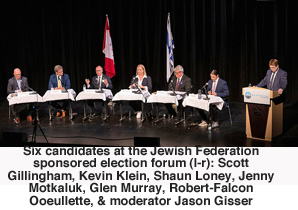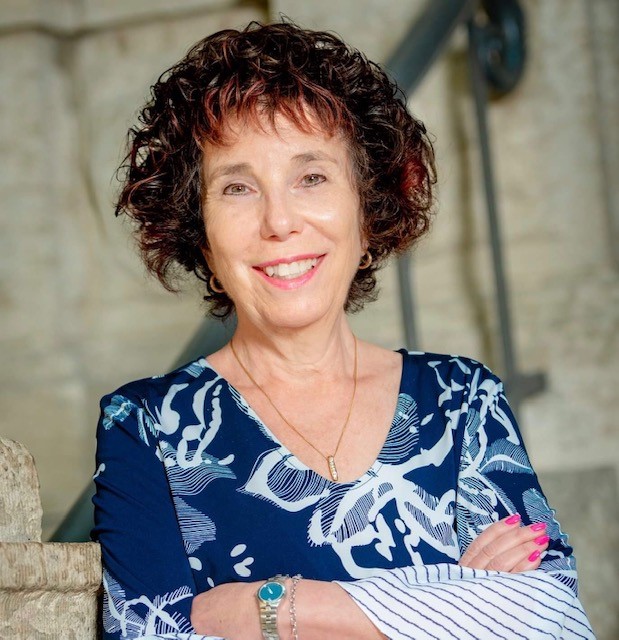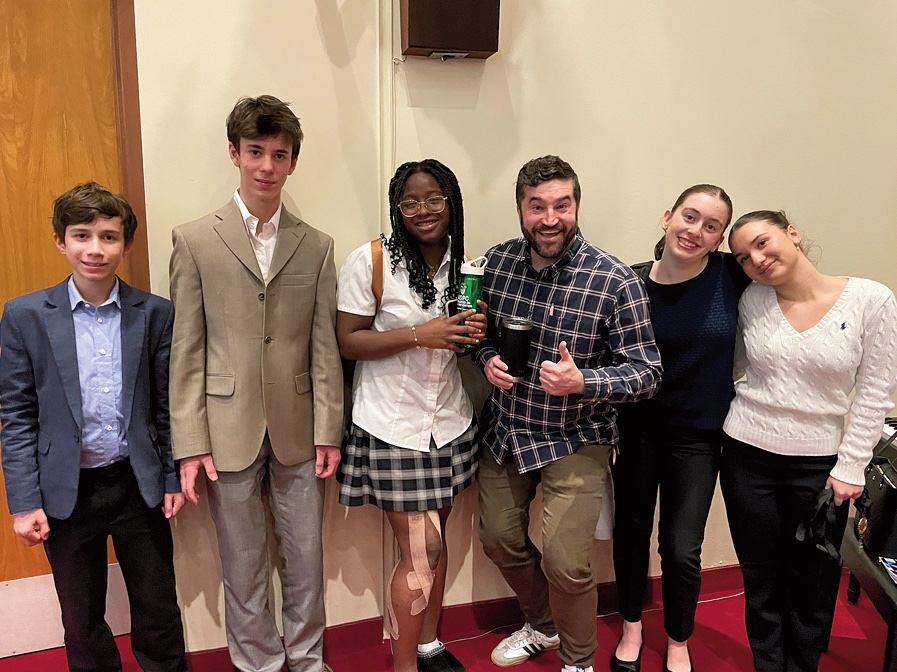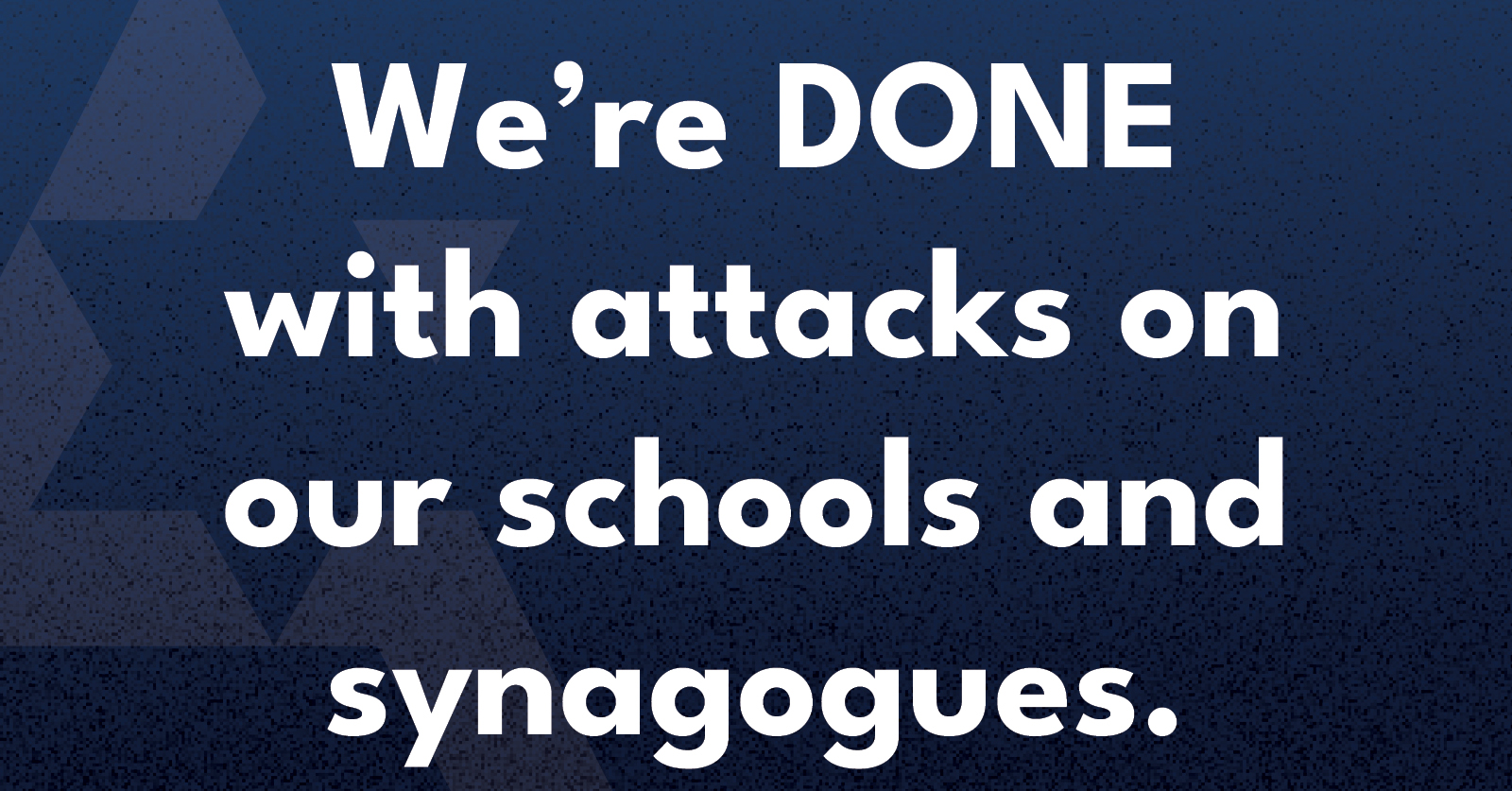Local News
Jewish Federation holds mayoralty election forum in front of packed audience at Berney Theatre, October 3rd
 By BERNIE BELLAN On Monday, October 3 the Jewish Federation of Winnipeg sponsored an election forum in which six of the leading mayoralty candidates were invited to participate.
By BERNIE BELLAN On Monday, October 3 the Jewish Federation of Winnipeg sponsored an election forum in which six of the leading mayoralty candidates were invited to participate.
As was explained by moderator Jason Gisser, the rules were that each candidate would be invited to give an introductory statement, after which he would pose a series of eight questions to the candidates.
Each candidate would be given one and a half minutes to respond to the question. Once all the candidates had responded to the question, Jason would invite two of the six candidates to add a further 20 seconds to what they had said initially.
While the format was conducive to what turned out to be a relatively genteel event, the fact that the candidates were not allowed to enter into any sort of exchanges with each other no doubt removed any opportunity for a livelier debate. Also, five other candidates for mayor were not even invited to participate.
What follows is my impression of the evening. I want to make clear that I do not support any particular candidate and have not made up my mind how I will vote. Reports that I have read to date either tend to focus on individual candidates or, when they do report on a particular election forum, are relatively truncated. Instead, as is my usual style in reporting on a fairly lengthy event, I like to offer the reader snippets of what occurred so as to give more of a flavour of what went on – without intending it to be a comprehensive repetition of what was said.
Looming over the entire evening, it must be noted, however, given the news story that the CBC had recently broken which raised questions about Glen Murray’s behaviour while he was the executive director of the Pembina Institute, was the possibility that one or another of the candidates would want to launch into some sort of attack on Murray, who is the clear front-runner according to the most recent poll.
The fact is that the only reference to that news story came at the very end of the evening when Robert-Falcon Ouellette made an obvious allusion to the story – when he told of his experience having served in the Canadian Armed Forces for 27 years. During that time, he noted, there was a strong emphasis placed on maintaining the utmost respect for moral behaviour within the armed forces.
Ouelllette went on to say that “No matter what you do at the end of the day, you need a moral leader who will stand up for what is right in our city, that there are certain actions which are unacceptable in our city and there are times as a leader you must say the truth and speak that truth.”
“And so I speak it here today and I hope people understand what it is I’m talking about because it’s certainly unacceptable for us to be here on this stage all together.” (Interestingly, the CBC story that quoted Ouellette had the spelling of that last word as “altogether.” I would suggest that would impart quite a different meaning to what he meant.)
But, that remark came late in the evening, when the candidates were invited to give closing remarks for two minutes each, and – after moderator Jason Gisser had finished posing questions to the candidates.
Prior to that time though each of the candidates certainly came across as articulate and passionate. Perhaps the one candidate who decided to try to separate herself from the pack most distinctly was Jennie Motkaluk, who took a more strident approach when, for instance, she referred at different times to “critical race theory” and “woke” attitudes. She also brought a few smiles from the other candidates when she said she really likes “growth and money.”
The first two questions that Jason Gisser posed, however, might have seemed somewhat parochial to any non-Jews in the audience (and probably a good many Jews as well). The first had to do with anti-Semitism and what each of the candidates would do to combat it if they were mayor. Would they be willing to attend a planned mayors’ conference on combating anti-Semitism? they were asked. Not surprisingly, none of the candidates came out with a position defending antisemitism.
The second question – and one that evidently caught some of the candidates off guard, was whether they would want the city to adopt the “IHRA” definition of anti-Semitism. It was clear that not all the candidates were up to speed on what the IHRA definition of anti-Semitism is. I’m not quite sure what bringing it up had to do with a mayoralty contest in Winnipeg. It reminded me of the effort some years back – not just in Winnipeg, but throughout the world, to declare cities “nuclear free zones” – an interesting proposal, no doubt, but what relevance does it have to urban issues?
The next question though was very much one that has elicited a huge amount of discussion during this election: What would the candidates propose to do about poverty and homelessness?
Glen Murray said that he had practical experience combating homelessness – even prior to serving as mayor of this city, when he helped to foster a neighbourhood housing project in the Spence neighbourhood where, he said, 300 houses were built.
Shaun Loney demonstrated an especially keen knowledge of this file, citing his own background as what he described as a “social entrepreneur,” placing a strong emphasis on creating jobs. “I would add add 1,000 social enterprise jobs to Winnipeg,” he said.
As far as housing is concerned, Loney said he would create a “$100 million land trust.”
“It’s not a money problem,” he added; “it’s a system problem.”
Robert-Falcon Ouellette was somewhat dismissive of candidates’ promises to alleviate homelessness and poverty, asking whether “any of the politicians here are going to do anything but check off all the right boxes? Politicians are great at discussing things,” Ouellette suggested, but when it comes to actually doing things –well, that’s a different matter.
Later he added this observation: “Seventy-five percent of homeless people are aboriginal. They don’t need a home; they need a friend.”
Kevin Klein related his own experience growing up in poverty. His mother was actually killed by his abusive father when he was a kid, he told the audience and “I’ve lived under the poverty line a good part of my life,” he said.
As for politicians not ever doing anything but discuss things, Klein said that he personally brought forward a motion at City Hall to create “Homes for Heroes” – a project that saw a small number of homes allocated to war veterans in Winnipeg.
Scott Gillingham said that he was proud to have been involved in the effort to create a certain amount of “modular housing” for people living below the poverty line. He also said that City Council is implementing a “poverty reduction plan” that he was involved in crafting.
As for Jenny Motkaluk – she said that “the solution for poverty is a really nice job.”
“I want to bring 16,000 high paying jobs” to Winnipeg, she added.
As for homelessness, Motkaluk said “there are 780 derelict houses in this city. I want to auction them off.”
Shaun Loney added that “we need to realize that governments and not-for-profits need to work together.”
Jason Gisser asked each of the candidates to describe their “bold vision” for the future.
Jenny Motkaluk said that “the single biggest impediment to growth and investment in this city is our political leaders.”
Glen Murray said “We need to spend money on things that will make this city more beautiful.” He noted that when he was mayor three of the projects that were built during his time in office included: Waterfront Drive, the Esplanade Riel, and the Canadian Museum for Human Rights. (He observed as well that the CMHR was a great example of all three levels of government working together.)
In contrast, he noted that the single largest project undertaken by the city since his time in office was “$200 million spent of refurbishing the Post Office.”
Shaun Loney pointed to the deterioration of Winnipeg’s “green canopy”, saying that there are 30 different organizations devoted to protecting and expanding the number of trees in the city. He said he would like to consolidate all those efforts and work hard to protect our imperiled urban canopy.
Robert-Falcon Ouellette proposed the creation of an “urban national park” within Winnipeg to add green space to the city.
Kevin Klein said that his bold vision is to make Winnipeg “safe”, noting that “We can’t attract more people here if they don’t feel safe. People won’t ride the bus if they don’t feel safe.”
The next question was about infrastructure.
Jenny Motkaluk said “We’re going to end the corruption” associated with infrastructure projects.
Glen Murray said “We need more value planning to determine whether a project will return in value what it cost to build.” He cited Waterfront Drive as a project that has paid back many times over what it cost the city to create the infrastructure for that development.
Kevin Klein did comment later though that residents of Waterfront Drive are now having to deal with a huge upsurge in break-ins.
Shaun Loney said that rather than think about expanding infrastructure we ought “to focus on the infrastructure we’ve already built.”
Robert-Falcon Ouellette cited the example of Quebec City and its transit system as something Winnipeg could emulate, saying that in that city “People really enjoy taking the bus.”
In response to that suggestion, Kevin Klein said that currently “Seven thousand people a day in Winnipeg don’t even pay for the bus.”
Scott Gillingham proposed extending the Peguis Trail and widening Kenaston Boulevard.
Jason Gisser asked about public safety and what each of the candidates would do to make Winnipeg safer.
Scott Gillingham said that as mayor he would sit on the police board. He also said that he would split up police calls so that police don’t respond to every call for service, with other personnel used in situations that would be better served by another type of emergency responder.
Shaun Loney called for a return to community based policing – with “more cops walking the beat,” adding that “people are going to continue to commit crimes unless they get the intervention they need.” He also observed that we need to “address homelessness” before we can make inroads in enhancing public safety.
After the final question was answered the candidates were allowed one final opportunity to sum up their platforms. As noted, it was then that Robert-Falcon Ouellette was the only candidate even to obliquely refer to the controversy that had recently surfaced about Glen Murray.
And, while five of the six candidates hung around afterwards to schmooze with audience members, Glen Murray took off immediately after the forum was over. I offer that not as an editorial comment – merely an observation.
Local News
Cheryl Hirsch Katz, Jewish Child and Family Service’s longest serving staffer, set to retire at end of the month

By MYRON LOVE “I loved working at Jewish Child and Family Service,” says Cheryl Hirsh Katz, who is due to retire at the end of June. “I have always appreciated the warm and welcoming atmosphere here. I feel that the people working here are my extended family. I am going to miss my colleagues”.
“I have derived great satisfaction over the years to have been able to help many people in our community of all ages through my work at JCFS,” she continues.
After 44 years at the agency, Katz, the longest-serving member of the staff, was given an appreciative send-off at the JCFS’s recent (June 23) Annual General Meeting at the Shaarey Zedek Synagogue.
The daughter of Art and Bess Hirsh, Cheryl grew up in Garden City. She attended Peretz School, then Jefferson Junior High and Garden City Collegiate. She joined the staff of JCFS in 1981, shortly after receiving her Bachelor of Social Work degree.
She earned an MSW in 1990.
“I chose to become a social worker,” she recalls, “because I always wanted to be able to help people.”
Katz was originally hired by JCFS to work with newcomers. After a couple of years, she was given responsibility for looking after the needs of older adults.
“I really enjoyed working in older adult services,” she says. “That is where I spent the bulk of my time at JCFS.”
After ten years as a case worker, she was promoted to a supervisory role. Later, she was also given responsibility for mental health and addictions programming and settlement services, while keeping the older adult files under her purview.
“As a supervisor, I wasn’t directly involved with individual clients,” she points out. “I was more involved with programming. Among the programs for seniors we organized were – for example – sessions on elder abuse, digital storytelling and memory loss.”
She notes that one of the trends she has seen over the last 44 years is that people are living longer and living in their homes longer. A lot more of our clients are living well into their 90s,” she observes. “We have had to continually expand our staff and the services we provide in order to accommodate the growing demands of an aging population.”
She also spoke of the mental health needs of seniors and aging Holocaust survivors.
She says that she has mixed feelings about leaving JCFS. “After so many years working full time, I am going to have to create a new routine,” she comments.
She notes that, now that she is retired, she will have more time to spend with her parents – who are in their 90s.
And then, there are the two dogs to look after. “I will have time now to try new activities,” she says. “ I might learn to play mah-jong.”
She speaks about maybe doing some traveling – although her husband, Murray, is still working full time.
(She and Murray have one daughter, Farah.)
“Retirement may also include some volunteering,” she adds.
It is quite likely, she will be continuing her association with JCFS but in a volunteer capacity.
Local News
Gray Academy students shine in provincial, national debating competitions

By MYRON LOVE It has been another good year for Gray Academy’s high school students who participated in provincial and national debating competitions. The best results were recorded by Grade 9 student Noa Mednikov, who finished fourth overall nationally, fourth in interpretive reading, and fifth in persuasive speaking at the junior National Public Speaking Championship in early May in Vancouver.
Last October, in the Junior Provincial British Parliamentary Championship – which was held at St. John’s-Ravenscourt – Noa and her partner, Raya Braunstein, finished third as a team while Raya placed third in individual debating.
Their fellow Grade 9 student Maxim Moscalenkov tied for first in persuasive speaking in Vancouver, while the Gray Academy team of Gabe Tapper and Aaron Koplovich finished fifth. Aaron also finished fifth in his individual debate.
Earlier, in March, Maxim finished fifth in the Provincial Juniors debating competition, which was held at Balmoral Hall He and his debate partner, Nate Shenkarow, finished seventh among the teams entered. Last November, he and partner, Ethan Tenenbein, finished seventh in the Junior Prepared Tournament – just behind the Gray Academy team of Nate Shenkarow and Jack Kay.
At the senior high level in that competition, the team of Jacob Tenenbein and Jonah Novoseller finished fourth and Jacob was recognized as fifth best in an individual capacity. Jonah and Jacob also paired up to win the Asper Cup, which was held at their home school.
Jacob represented Manitoba at the Junior National Speech Championship in Vancouver in May and, last October, he and Grade 12 Gray Academy students Julie Krozkin and Daniel Bokser represented Canada at an international debating tournament in Bermuda.
Gray Academy’s debating program was introduced by Linda Martin in 2003. She also led the debating teams at Balmoral Hall. In 2011, Martin was succeeded by Gray Academy high school English teacher Andrew Kaplan.
“Andrew has done a wonderful job with the debating program” says Martin, who has a debating trophy at Gray Academy named in her honour, as well as a provincial trophy for best individual junior debater. “Over the years, Gray Academy students have done very well in many local, national and international competitions,” she adds.
About three weeks ago, this writer had the opportunity to sit down with Andrew Kaplan and six of the school’s top debaters while they discussed the benefits of learning how to debate. According to Noah Strauss – who competed in the Junior Provincials at Balmoral Hall in March, public speaking leaves him with a feeling of accomplishment.
“It’s a good skill set to have,” he observes. “It builds confidence.”
“A benefit of being able to debate is that you learn how to convince people that you know what you are talking about,” adds Maxim Moscolenkov.
Raya Braunstein notes that being able to debate is a skill that she expects to be helpful in many university courses which she may choose to take.
As Andrew Kaplan notes, the ability to express yourself has a great impact in whatever career you choose to pursue.
He points out that debating is compulsory at Gray Academy for all Grade 7 and 8 students – and students can continue debating as an option in the higher grades
Of course, competitive debating is not for everyone. For those students who opt to take that path, the journey begins with internal school debate competition – with the top debating teams and individuals qualifying for local tournaments and – potentially – beyond.
Andrew Kaplan reports that a small number of high schools in Winnipeg and southern Manitoba have active debating programs – including St. Johns Ravenscourt, St. Paul’s High School, St. Mary’s Academy, Garden City and Maples Collegiates in the Seven Oaks School Division, St. Maurice (a Catholic School), as well as Morden Collegiate and Dasmesh, a Sikh private school.
Kaplan expresses his appreciation to the Asper Foundation and an endowment spearheaded by the Kives Family for providing funding for the Gray Academy debating program – as well as the Andrew Slough Foundation – which was established by his friends in memory of the outstanding former Ravenscourt student debater and lawyer who passed away suddenly two years ago at the still young age of 38.
I am confident that our Jewish community can look forward to the continued success of Gray Academy’s star debaters and to the continual emergence of future stars as the times goes by.
Local News
Antisemitism has crept into grade school in Canada

Antisemitism in Canada has moved beyond protests and politics; it is now entering classrooms and altering how Jewish children see themselves functioning within them.
A a university student I have observed the experience of my younger brother in grade eight as a Jewish student. Over the past few months, his school has been at the center of several deeply troubling incidents that have made him feel unsafe in our parks, community, and even his school. Swastikas were drawn around the community, in parks and ponds. Additionally, an older man, who claims to be a pro-Palestinian influencer, stood outside his predominantly Jewish school wearing a keffiyeh, filming a video which then circulated between students on TikTok.
This same man later showed up to our local Jewish community center in keffiyeh to allegedly watch his son play basketball where my brother and many of his classmates go for their lessons, basketball games, and Jewish events. These moments made him and his peers feel watched and targeted just for being Jewish. Local political representatives condemned the incidents and raised awareness about antisemitism, but the fear among students didn’t go away. The feeling of being targeted for simply existing has been taught to my brother, something my parents had tried their hardest to escape from.
Most recently, my brother was chosen to represent his school at a regional science fair. When one of the judges arrived wearing a keffiyeh, he froze. For many, including my brother after the incidents he has faced, the keffiyeh represents a political message. But even more so for my younger brother, it is tied to the fear and intimidation he had already experienced. He felt nervous, distracted, and unsure of how to act.
This is not about silencing political expression. It is about a child who came to share his ideas and left feeling uncertain and afraid. It is about the atmosphere forming in Canadian schools, where Jewish students are being made to feel targeted and unwelcome.
His school made an effort to address the incidents, but the impact is lasting. Posts on social media, much can be very vague at times about inclusion cannot fully undo the feeling of being singled out. A kind word from a teacher does not erase the fear that builds when threats are left unspoken but deeply felt.
I am writing this as a sister who watched her younger brother lose a moment that should have been filled with confidence and pride. He deserved to feel safe. So do all Jewish students in this country.
Moving forward, schools must take concrete steps to protect all students. Antisemitism cannot only be addressed when it becomes violent or overt. It must also be recognized when it appears as intimidation, symbolic targeting, or political messaging that creates fear among students. Children should never have to question whether they are safe in their own classrooms or community spaces.
Events that are meant to support and celebrate students must remain focused on them. Individuals who feel the need to bring political symbols or messages into school grounds or children’s events should not be welcomed in those spaces. Schools must make it clear that their environments exist to support learning, safety, and inclusion, not to host agendas that can intimidate or isolate students.
Administrators and educators must develop clear guidelines for identifying and responding to antisemitic behavior in all its forms. This includes strengthening security measures, offering ongoing staff training, and engaging directly with Jewish families to understand their concerns. Inclusion is not a one-time statement. It is a responsibility that must be reflected in everyday decisions and actions. No child should ever feel unsafe or unwelcome because of their identity.
The author is a Campus Media Fellow with HonestReporting Canada and Allied Voices for Israel who lives in Toronto.
